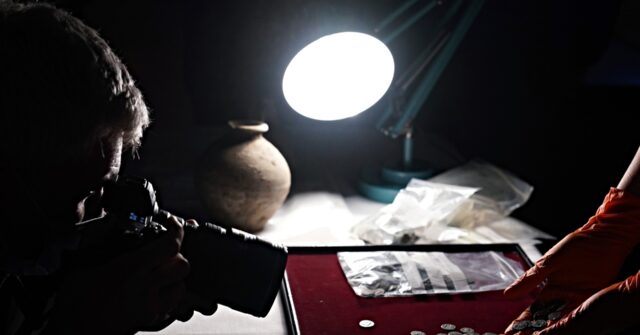Seek and ye shall find. An amateur metal detectorist profoundly believes in that maxim and it came true when he uncovered up to 15,000 Roman coins buried in a hoard that could be Wales’ biggest-ever treasure find.
The BBC reports David Moss, 36, from Cheshire, made the discovery that left him in disbelief after he dug up up two clay pots in an undisclosed northern part of the country.
But the epic find in a muddy field left him fearing they could be stolen, so he slept with the treasure in his car for three days before taking the coins to experts, the BBC notes.
The coins are now in the safe hands of the National Museum Cardiff where they will be analysed, but one expert believes it will likely prove to be the biggest ever discovery in Wales.
David described the area — which he has chosen to keep secret – as a “virtually untouched” area. He added:
You’re talking from the times of the druids and the Vikings right through to the Romans.
I just find it fascinating.
It’s an area that I’ll be interested in for the rest of my life.”
As Breitbart News reported, amateur detectorists have found hidden coin hoards in abundance across the UK in the past.
Charlie Clarke was a rookie metal detectorist — someone who uses a metal detector as a hobby — in 2019 when he found an ornate gold pendant in Warwickshire, England.
Engraved on the heart-shaped pendant are symbols of the Tudor King Henry VIII and his first wife, Katherine of Aragon, who married him in 1509.
Clarke recalled, “It was just outstanding. Nobody thinks you’re ever going to pull out that, in my lifetime especially — I can imagine in 30 lifetimes.”
In 2024 a 1,000-year-old Viking “wallet” containing dozens of silver coins was recently discovered by British historians on the Isle of Man.
The coins were minted under multiple different Irish and English rulers, with the majority from the reign of Edward the Confessor (1042-1066 AD), as well as English kings Aethelred II (978-1016 AD) and Canute (1016-1035 AD).
The Irish coins “date from the middle of decades of AD 1000 and were all minted in Dublin,” the historical organization said, describing how they feature the profile of King Sihtric Silkbeard, a Hiberno-Norse king of Dublin who ruled from 989 to 1036 AD.
File/A Roman coin hoard of over 6.500 copper-alloy nummi (coins), originally contained in three separate pots, (AD 300-400), found in Wickwar, Gloucestershire, on display at the British Museum in London, on Tuesday December 14, 2021. (Yui Mok/PA Images via Getty Images)
As for the latest discovery, Anthony Halse, 64, is chairman of the South Wales and Monmouthshire Numismatic Society and believes the haul could be the biggest discovery in Wales.
Anthony further holds the haul could have belonged to a member of the Roman army, or multiple members, who buried the coins for safekeeping.
“I would have thought that it was a person’s wealth that could be in a section of the army,” he said.
Anthony said the museum in Cardiff will date when the coins were buried, the BBC report further adds.
“They’ll clean them and then since it’s such a large hoard they will apply to the British Museum to see if they can keep them,” he said.
“Then they’ll go to the board and make the finder an offer. He’ll get half the money and the landowner will get the other half.”
A spokesperson for Cardiff’s museum said the assessment should be completed next year.
Follow Simon Kent on Twitter: Follow @SunSimonKent or e-mail to: [email protected]
Read the full article here
